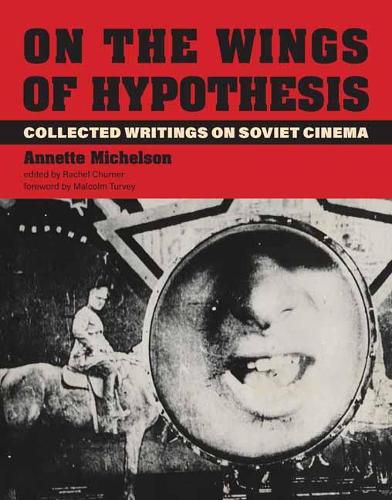Readings Newsletter
Become a Readings Member to make your shopping experience even easier.
Sign in or sign up for free!
You’re not far away from qualifying for FREE standard shipping within Australia
You’ve qualified for FREE standard shipping within Australia
The cart is loading…






Annette Michelson’s erudite and incisive readings of the revolutionary films of Sergei Eisenstein and Dziga Vertov, collected for the first time.
This posthumous volume gathers Annette Michelson’s erudite and incisive readings of the revolutionary films of Sergei Eisenstein and Dziga Vertov, giving readers the opportunity to track her sustained investigations into their work. Michelson introduced American audiences to Soviet cinema in the early 1970s, extending the interpretive paradigm she had used for American filmmakers of the mid-twentieth century–in which she emphasized phenomenological readings of their work–to films and writings by Eisenstein and Vertov. Over four decades, Michelson returned again and again to what she calls, following Eisenstein, intellectual cinema –the deliberate attempt to create philosophically informed analogues for consciousness.
The volume includes Michelson’s major essays on Eisenstein’s unrealized attempts to make movies of both Marx’s Capital and Joyce’s Ulysses, as well as her authoritative discussion of Vertov’s 1929 masterpiece The Man with a Movie Camera. Together, the texts demonstrate Michelson’s pervasive influence as a writer and thinker, and her role in the establishment of cinema studies as an academic field. This collection makes these canonical texts available for a new generation of film scholars.
$9.00 standard shipping within Australia
FREE standard shipping within Australia for orders over $100.00
Express & International shipping calculated at checkout
Stock availability can be subject to change without notice. We recommend calling the shop or contacting our online team to check availability of low stock items. Please see our Shopping Online page for more details.
Annette Michelson’s erudite and incisive readings of the revolutionary films of Sergei Eisenstein and Dziga Vertov, collected for the first time.
This posthumous volume gathers Annette Michelson’s erudite and incisive readings of the revolutionary films of Sergei Eisenstein and Dziga Vertov, giving readers the opportunity to track her sustained investigations into their work. Michelson introduced American audiences to Soviet cinema in the early 1970s, extending the interpretive paradigm she had used for American filmmakers of the mid-twentieth century–in which she emphasized phenomenological readings of their work–to films and writings by Eisenstein and Vertov. Over four decades, Michelson returned again and again to what she calls, following Eisenstein, intellectual cinema –the deliberate attempt to create philosophically informed analogues for consciousness.
The volume includes Michelson’s major essays on Eisenstein’s unrealized attempts to make movies of both Marx’s Capital and Joyce’s Ulysses, as well as her authoritative discussion of Vertov’s 1929 masterpiece The Man with a Movie Camera. Together, the texts demonstrate Michelson’s pervasive influence as a writer and thinker, and her role in the establishment of cinema studies as an academic field. This collection makes these canonical texts available for a new generation of film scholars.